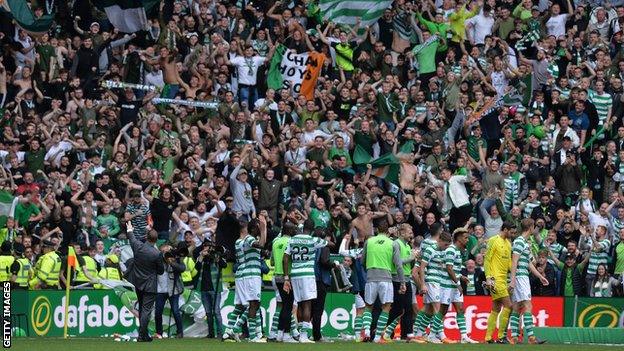Celtic 'contribute more to Scottish economy than Commonwealth Games', says report
- Published

Scottish champions Celtic are the "25th strongest brand in world football"
Celtic contribute around £165m to Scotland's economy annually - more than the 2014 Commonwealth Games - according to a report commissioned by the club.
The Fraser of Allander Institute economists examined spending by the Scottish champions and their spectators during the 2016-17 season.
Celtic chief executive Peter Lawwell hoped policy makers would take note.
"The economic contribution from football, and Celtic in particular, is consistently undervalued," he said.
The reports states:
Celtic and their supporters contributed £165m in 2016-17 to the Scottish economy
The spending helped support the equivalent of 2,820 full-time equivalent jobs
Celtic Park is the seventh most popular visitor destination in Scotland
Celtic FC is the 25th strongest brand in world football
Celtic's club website ranks 23rd in world football for "hits", with more than one third coming from outside Scotland
Almost two million fans attended matches involving Celtic during the 2016-17 season
More than 40% of Celtic's day-to-day spending was with Scottish firms
The institute states that other studies have estimated golf tourism's contribution to Scotland's GDP is around £157m each year, while the one-off economic impact of the Commonwealth Games in 2014 to Scotland was valued at £125m.
"While a huge amount of attention is rightly paid to one-off events like the Commonwealth Games and other activities which attract interest to Scotland and Glasgow, football's economic contribution tends to be overlooked - yet it brings people here from around the world," Lawwell said.
He said the report was commissioned to help the Scottish Government and Glasgow City Council recognise that football clubs like Celtic "are significant economic players when it comes to issues like transportation links and tourism promotion" and the report recommends further research to create "integrated" policies.
The report also highlights the particular importance to Glasgow's economy, with more than one million people visiting during the season, mainly from within Scotland.
However, 54% of visitors from outside Scotland stay in paid accommodation.
The report notes Celtic's social contribution, saying that "the work of Celtic FC Foundation is quite unlike standard football club foundations in scale and scope with its focus on improving heath, promoting equality, encouraging learning and tackling poverty".
It also notes that Celtic is "the only football club in Scotland with Investor in People accreditation" while "all permanent staff members are paid in excess of the current Living Wage".
Professor Graeme Roy, director at the Fraser of Allander Institute, said the Strathclyde University report "suggests that there is an opportunity to use regular major events - such as Scottish football - as a lever to help support economic development".